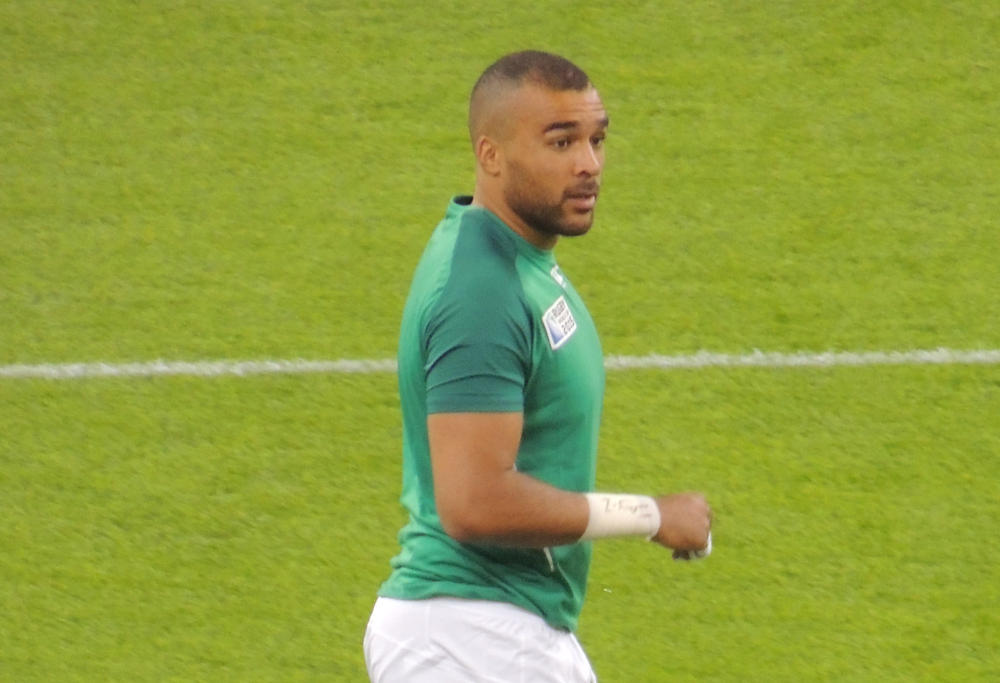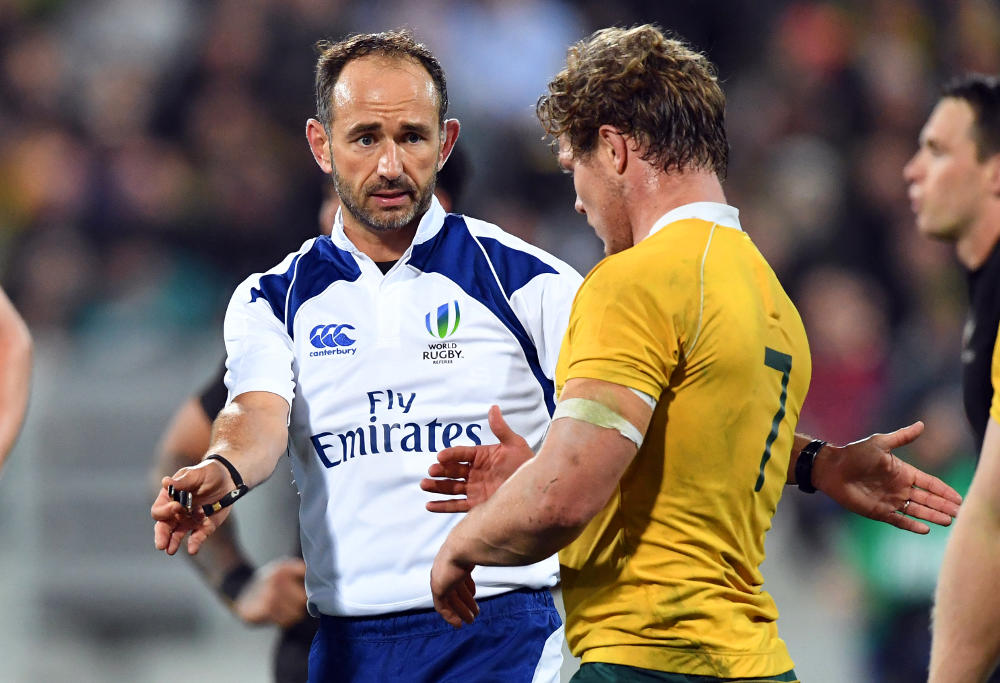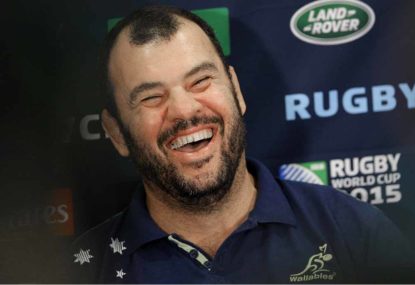Having watched the brutal second Test between the mighty All Blacks of New Zealand and Ireland on the weekend, I suspect the casual Wallabies fan is in for a rude shock this weekend.
Ireland are a proud rugby nation, who traditionally enter a contest with a rather attractive take on the traditional Northern Hemisphere ten-man style of the game, you know, if you’re the kind of person who is into that kind of thing.
England’s meteoric rise under Eddie Jones has all eyes on Twickenham as Australia pursues a coveted Grand Slam, but it would be ill-advised to expect the Poms will be our toughest opponent on tour.
For anyone who didn’t watch Ireland play the All Blacks, complaints from the Irish that they were robbed are justifiable, if not justified. With that victory, so too were Ireland robbed of a second triumph over the reigning world champions to back up the one the week before, the first in a 111-year rivalry.
Valid arguments have been made not one but two of the All Blacks three trips across the paint were not, in fact, tries; with grounding and a potential forward-pass casting doubt on the first and final tries respectively.

Add that Malakai Feikitoa could easily have been red carded for a reckless tackle and a number of his teammate s were lucky to not spend time in the naughty chair, giving the Kiwis a third yellow card and it’s very possible the Irish could have taken the honours.
Of course the referee is the sole judge of play, all that guff. And while coaches and players must respect the ethos, even The Roar’s elder-statesman Spiro Zavos will admit, from time-to-time, it’s the role of journalists to question the referee if he deserves as much.
Assuming that role as I am, because that’s just the kind of guy I am today, I feel compelled to question the outcome of the second Test match. It’s my opinion, without a horse in the race or any accusation, that if the match was refereed evenly that full-time score would have favoured the contenders rather than the champs.
Alas it was not to be, and truth be told I’m not here to re-write history. Rather, I want to covey the magnitude of the challenge we face on the weekend to the two-dozen or so fans Australia have left.
If I was to pick one statistic to describe it, it would be that about 18 minutes into the second half of BeIn Sport’s frankly excellent broadcast, an incomprehensible number flashed on the screen. Ireland held their opponent to just 12 per cent across pretty much the entire third quarter.
They earned this hunting in packs, dominating contact and taking full advantage of New Zealand’s tactical decision to limit commitment to the rucks to an extreme degree on defence. And then supported it with wonderful improvised attacking play and unstoppable will to win. On the surface it would seem Australia are outgunned from the off.
However, after god-knows how many rum based cocktails last night, a few old rugby-heads and I got talking about how one might beat Ireland if they found themselves in Michael Cheika’s shoes.
Many more cocktails were consumed, and many a theory put forward, often to veracious debate in the style of the forum of ancient Greece; it is said, after all, that only the Greeks understand the art of conversation.
A theory was proposed, and thinking with a sore head this morning it seems analogous for not just the upcoming Test but the remainder of the World Cup cycle as well.
Every position in rugby has two or three primary skills. A prop, for example, must be an excellent scrummager and a brick-wall in close-range defence. Locks must be effective in the line out and dominant in contact.
A number 7 must protect attacking ball at the breakdown and disrupt the ball of his opponent. And your fly-half, among other things, must have a hair-cut which makes you question his intelligence and should probably be decent with the ball-in-hand as well.
All too often players at the highest level are selected based on an elite talent in their primary skill, at the expense of proficiency in key secondary-skills. Rob Simmons as a line-out wizard, for example or Will Skelton in the role of token giant.
Modern rugby, in the style played by Ireland and New Zealand, requires each and every man on the field to have outstanding secondary skills and what will now be dubbed the theory of York Street’s Cuban Place posits that Australia’s ability to gain proficiency in three specific secondary skills will make or break them.
First and perhaps primary among these skills, for Australia, is the need for forwards who run the ball with purpose. With our strongest team fielded we have only Sekope Kepu, Adam Coleman and Lopeti Timani. Michael Hooper runs well but is too small to make the difference in-tight. Rory Arnold, Scott Sio and Stephen Moore step up on occasion.
Over the next four years it should be primary among Michael Cheika’s priorities to develop at least six starting forwards who are competent with ball-in-hand and as a minimum win half of their collisions. This is of particular importance when facing the All Blacks as their defensive pattern leaves a weakness, albeit a small one, around the fringes of the ruck.
Backs are next in the firing line, with tactical kicking being our key focus. Installing Reece Hodge has been a huge step in the right direction, Dayne Haylett Petty hasn’t hurt but we still have two outside centres and a swag of wingers who cannot kick effectively against international opponents.
For god sake, just move Israel Folau to the wing already so Haylett-Petty can take the fullback kicking duties. If a stint in AFL didn’t fix his boot nothing will, and while sub-par at fullback his kicking would be more than sufficient on the wing.
Johnny Sexton’s exclusion might buy us half of a free-pass on this on the weekend, but nothing more. We have to continue to improve and the faster the better!
Finally, we’re in desperate need on non-Pocock players who can jackal the ball in defensive rucks. David Pocock is talismanic because he almost single-handedly defines how much possession Australia has on any given day.
Sam Cane is a fine player without question, but he is not on Pocock level. However, the All Blacks make up for this this effectively by having 15 players who can force turnover ball at the break-down.
Incidentally this same dynamic is what allows New Zealand to play with such low commitment at the rucks in defence.
What many don’t realise is that the value of a good number 7, and equally any other player who can jackal in defence, is that they can slow down the oppositions ball with the same effectiveness as three or four players committing to the ruck without challenging the ball.
New Zealand take advantage of this to keep the number of players committed to the ruck to a bare minimum while buying time and extra players to set their defensive wall. It is, one could say, the air their defence needs to breathe.
Acknowledging that blueprint, it’s easy to see why Pocock, as Australia primary jackal, is so very important. Not nearly enough has been made of the hole his sabbatical will leave in Australia’s game-plan next year.
With Liam Gill in France and no secondary fetcher in-sight, Michael Cheika has left himself with an awful problem. Perhaps one will appear, or Sean McMahon’s skill in this area will continue to grow, but either way we’re likely to be several turnovers short of Pocock.

My best response is that a second fetcher, who will not be David Pocock, must be found and the gap in skills must be covered by a concerted effort from coaching staff to increase skills around the park – if just one third of the Wallabies players can win earn one jackalling turnover per match, and create a number of attempts, we’ll be in very good shape indeed – it’s not a ridiculous ask.
What does all of this mean? Well, it means that the weekend; win, lose, or draw, will be a fantastic yard-stick of the progress made by Australia in these crucial areas and that Mick Byrne is likely the second most important man in camp Wallaby at the moment.
When you consider Byrne’s positions as national skills coach (meaning his responsibilities extend to Super Rugby) it’s possible that he is, in fact, the most important man in the country.
Byrne entered with an impressive resume, most recently as skills coach for the reigning world champions; however he has quite the task at the moment with Australia having long been deficient in basic skills where secondary to a position.
Whether he can change things in time remains to be seen. However, on pedigree alone we can say one thing for sure. Cheika, as he tends to do, has put the right man in the right job at the right time and we must all hope that he has done enough to earn a Wallaby victory on the weekend.































































































